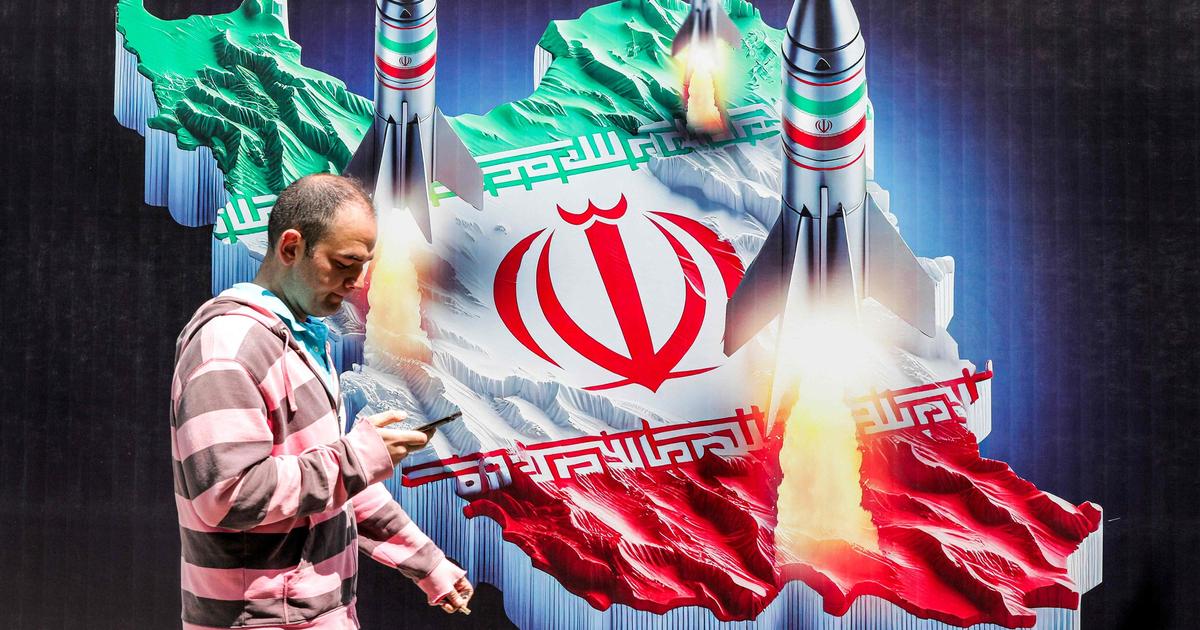Sophia Mahroug is a doctoral student in the History of Contemporary Iran (Sorbonne University, University of Luxembourg) and a teacher at Sciences Po.
April 6, 9:35 p.m. The photograph of small white sneakers speckled with blood of a child killed in Gaza is published in a pro-Iran Telegram channel.
“Never get used to the scene of their death!”
is it captioned in French. In this channel, no need to know Persian to browse the approximately 33,000 photographs and 24,000 videos of swollen faces and torn limbs, when they are not Shahed-136 drones proudly exhibited. Behind the horror of war lies the perfectly mastered exploitation of images and the narrative of the
“axis of resistance”
that Iran forms with its regional allies. Information about public gatherings for Palestine in France is also disseminated there, for all purposes. With more than 14,100 subscribers in January, 17,000 in April, the publications are flowing and the audience is growing. We can predict promising success for French-language advertising for the
“axis of resistance”
! Because this is where the problem lies: French research, which only twenty years ago could boast of having excellent Iranologists, is faced with great difficulties in renewing its historiography of Iran, lack of sources, lack of security, lack of access to the land. If we can welcome the efforts of the General Secretariat of Defense and National Security (SGDSN) and the creation in July 2021 of Viginum against foreign digital interference, no Iran specialist seems to have participated in this French initiative .
The lack of collegial reflection leads us today to great confusion around the Islamic Republic in the media debate. A look of historians and political scientists directed at the elites and the political thought of this regime would, however, help us to better understand the substance of these Telegram channels. When we refine our knowledge of the Islamic Revolutionary Guard Corps – paramilitary legion or
“praetorian guard”
of the Supreme Guide, created in April 1979 to ensure internal security and preserve the revolutionary ideals of Khomeini – we easily guess that this Legion relies on a futurological vision of the world to avenge history. The little-known doctrine of
“soft defense”
(
defâ'-e narm
), formulated in 2021 by the commander-in-chief of the Legion and his gray eminence in several Iranian strategic journals available online, is based on a set of
“measures defensive and offensive"
, to
"maintain and strengthen the beliefs and convictions of citizens"
, in the face of the psychological wars waged by the United States since 1945. Since the post-electoral popular uprising of the Green Movement in June 2009, this doctrine has been nourished a rich volume of American strategic work and Canadian cognitive studies, in order to master all the characteristics of
soft power
and psychological manipulation using new information and communication technologies.
The Iranian “Soft Defense” intelligently relies on the praise of the underprivileged to gain favor with audiences previously chosen to be manipulated.
Sophia Mahroug
This “soft defense” is in reality a pernicious demilitarized offensive. It penetrates consciousness, manipulates emotions and exacerbates identity fractures in France with each new event, thanks to its Telegram channels and its X accounts (ex-Twitter) which publish without measure dismembered Gazan children and popular demonstrations in France which are spoil. The Iranian “soft defense” intelligently relies on the praise of the underprivileged to gain the good graces of audiences previously chosen to be manipulated. The use of the Telegram API, this computer program which communicates the data found in the channels, reveals in fact that targets are privileged, like the Equality and Reconciliation activists, close to Alain Soral, and Rebels.
Make no mistake, a simple technical dismantling of these broadcast channels translated into French will not be enough. Other accounts will then be created and new platforms will certainly be offered. To get to the root of the problem, active participation of Iran's human and social sciences researchers is necessary to translate the scientific literature offered by the regime's numerous
think tanks
, explore digital social networks and archive web data. Strategic or militant readings of Iran alone will not help us understand the sociology of Iranian elites, the structure of the state apparatus and the contemporary doctrines of the Islamic Republic; the same supplication for an imminent annihilation of the power of the mullahs – a master story which finds its origin in the journalistic glossary of the Iranian Revolution of 1979 – is now obsolete. The Revolutionary Guards who lead the “soft defense” are not clerics: they are trained in civil and military engineering, excel at taekwondo, reign over the media, construction companies, insurance companies and banks, more than they do not master Islamic jurisprudence. Beyond the fear of military escalation, the “soft defense” of the Islamic Revolutionary Guard Corps governs contemporary codes of the market and informational warfare.

